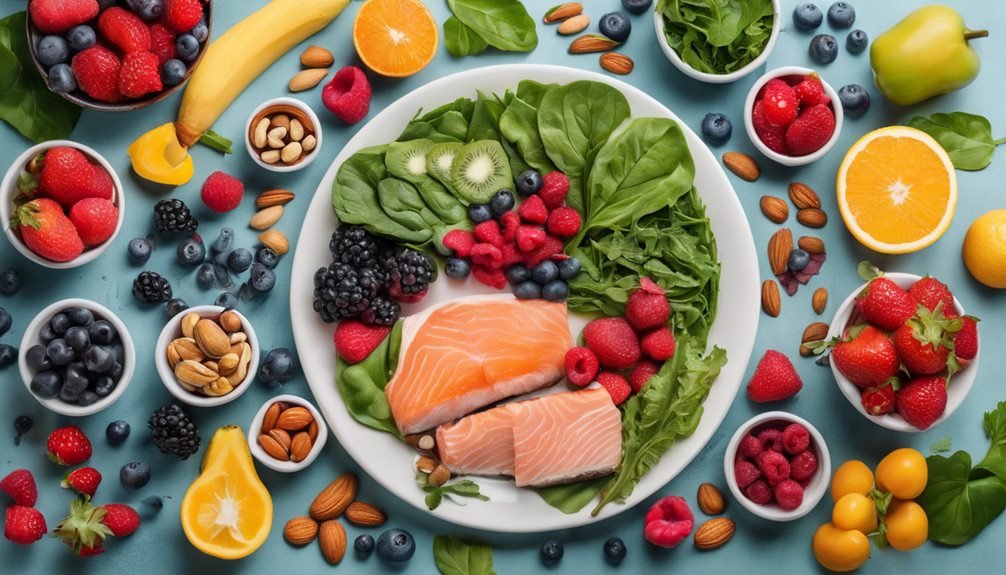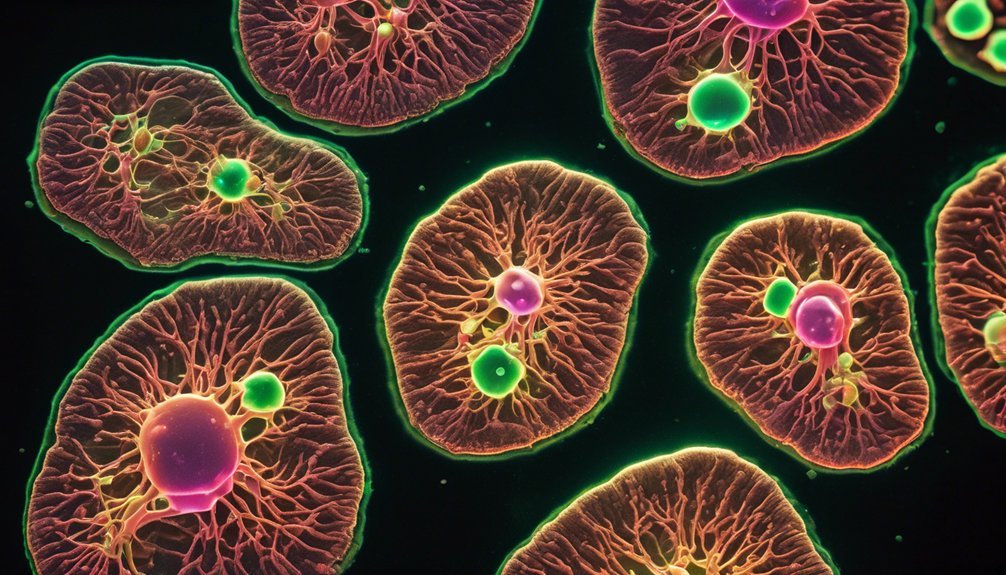You may not be aware that inflammation plays a significant role in cancer development and progression, affecting the body's ability to fight the disease effectively. By adopting an anti-inflammatory diet, you can actively support your body's natural defense mechanisms and potentially improve your cancer management outcomes. Understanding how specific foods can either fuel or combat inflammation is crucial in creating a diet that promotes healing and overall well-being. So, let's explore the powerful impact of anti-inflammatory diets on managing cancer and how simple dietary changes can make a substantial difference in your journey towards health and recovery.
Key Takeaways
- Include superfoods like berries, leafy greens, and turmeric to reduce inflammation and support cancer management.
- Opt for antioxidant-rich foods to protect cells and combat inflammation for better cancer outcomes.
- Avoid processed foods and sugars to reduce inflammation and support the immune system during cancer treatment.
- Incorporate herbs and spices like turmeric, garlic, and ginger with anti-inflammatory properties into your diet.
- Stay hydrated with at least 8-10 cups of water daily to maintain electrolyte balance and aid nutrient absorption for optimal health.
Understanding Inflammation and Cancer
To effectively manage cancer, it's crucial to understand the link between inflammation and this disease. Inflammation markers play a significant role in the development and progression of cancer. Research has shown that chronic inflammation can contribute to DNA damage, cell proliferation, and immune suppression, all of which are factors that promote cancer growth. By understanding this connection, steps can be taken towards cancer prevention.
Monitoring inflammation markers in the body can provide valuable insights into one's risk of developing cancer. High levels of certain markers, like C-reactive protein (CRP) and interleukin-6 (IL-6), have been associated with an increased likelihood of cancer development. By keeping these markers in check through lifestyle modifications, such as adopting an anti-inflammatory diet, individuals can potentially lower their risk of cancer.
Incorporating anti-inflammatory foods like fruits, vegetables, whole grains, and healthy fats into your diet can help reduce inflammation in the body and support overall health. By being mindful of inflammation markers and making informed dietary choices, you can take proactive steps towards cancer prevention.
Benefits of Anti-Inflammatory Diets
Incorporating anti-inflammatory diets into your lifestyle can offer a range of benefits for managing cancer. Research studies have shown that these diets, rich in fruits, vegetables, whole grains, and healthy fats, can help reduce inflammation in the body, which may play a role in cancer development and progression. By choosing the right foods and cooking techniques, you can support your overall health and well-being while potentially aiding in cancer management.
Here are some key benefits of anti-inflammatory diets supported by research studies:
| Benefits | Description | Evidence |
|---|---|---|
| Reduced Inflammation | Certain foods can help lower inflammation levels in the body, potentially benefiting cancer patients | [Study 1](insertlink), [Study 2](insertlink) |
| Improved Immune Function | A diet rich in nutrients can support a healthy immune system, crucial for fighting cancer | [Study 3](insertlink), [Study 4](insertlink) |
| Enhanced Overall Well-being | Following an anti-inflammatory diet may lead to better energy levels and improved quality of life | [Study 5](insertlink), [Study 6](insertlink) |
Key Components of Anti-Inflammatory Diets
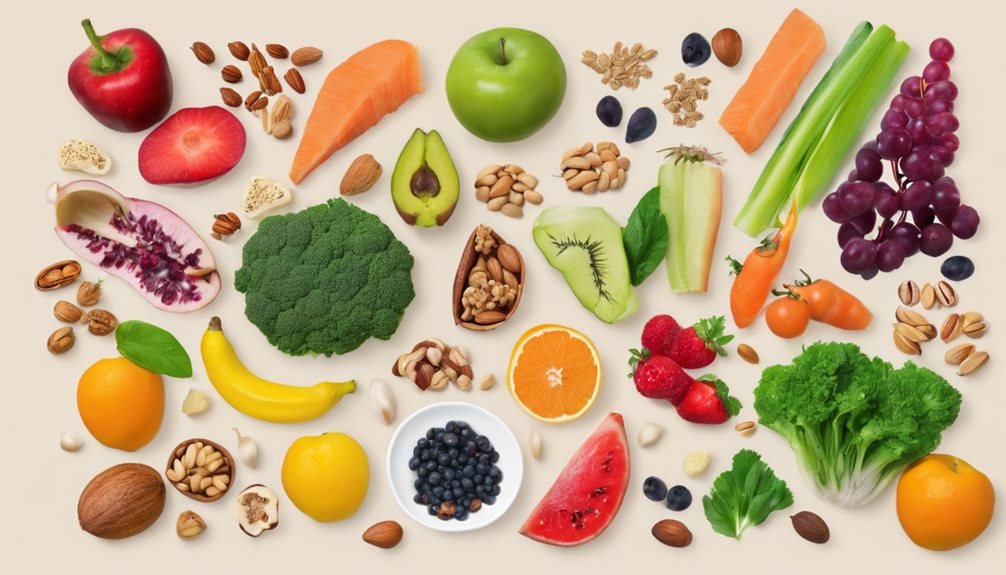
With anti-inflammatory diets playing a crucial role in managing cancer, understanding the key components of these diets becomes essential. Inflammation is a process in the body that can contribute to cancer progression. By incorporating anti-inflammatory foods into your diet, you can help combat this process.
Key components of anti-inflammatory diets often include:
- fruits
- vegetables
- whole grains
- lean proteins
- healthy fats like those found in nuts and seeds
These foods are rich in antioxidants and phytochemicals that can help reduce inflammation and support overall health.
In addition to food choices, dietary supplements can also play a role in reducing inflammation. Omega-3 fatty acids, turmeric, green tea extract, and probiotics are examples of supplements that have been studied for their anti-inflammatory properties. Before incorporating any supplements into your diet, it's important to consult with a healthcare provider to ensure they're safe and appropriate for you.
Foods to Include in Your Diet
How can you make a positive impact on managing cancer through your diet? By incorporating superfoods for inflammation and cancer-fighting nutrients into your meals, you can support your body in the fight against cancer.
Superfoods like berries, leafy greens, turmeric, and fatty fish are packed with antioxidants and anti-inflammatory properties that can help reduce inflammation and support your immune system. Incorporating cancer-fighting nutrients such as vitamin C, vitamin E, selenium, and zinc can also play a crucial role in protecting your cells from damage and supporting overall health.
Including a variety of colorful fruits and vegetables in your diet ensures you're getting a wide range of nutrients that can help combat cancer cells. Whole grains, nuts, and seeds are also important additions as they provide fiber, essential fatty acids, and phytonutrients that promote overall well-being.
Foods to Avoid or Limit
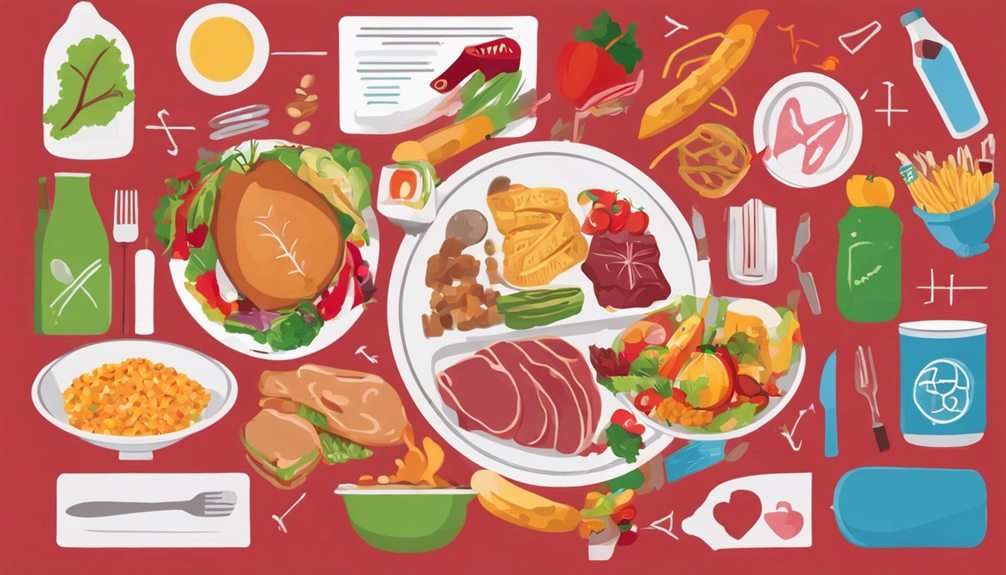
To effectively manage cancer through your diet, it's essential to be mindful of the foods you should either avoid or limit. When it comes to harmful additives, steer clear of processed foods containing artificial preservatives, colorings, and flavor enhancers. These additives can contribute to inflammation in the body, potentially exacerbating cancer-related symptoms.
Processed sugars, found in sugary drinks, candies, and baked goods, should also be limited as they can lead to spikes in blood sugar levels and promote inflammation.
It is crucial to read food labels carefully and opt for whole, unprocessed foods whenever possible. Choose fresh fruits and vegetables, lean proteins, whole grains, and healthy fats to support your overall health and well-being. By avoiding or limiting foods with harmful additives and processed sugars, you can help reduce inflammation in your body and create a more supportive environment for managing cancer effectively. Remember, small changes in your diet can make a big difference in your journey towards better health.
Meal Planning Tips for Cancer Patients
For cancer patients, meal planning plays a crucial role in maintaining optimal nutrition and supporting overall health during treatment. When faced with the challenges of battling cancer, focusing on well-balanced meals can make a significant difference. Here are some meal planning tips to help you through this journey:
- Plan Ahead: Take time to plan your meals for the week, making sure they're nutritious and easy to prepare.
- Include a Variety of Foods: Incorporate a colorful array of fruits, vegetables, whole grains, and lean proteins to ensure a balanced diet.
- Make a Grocery List: Before heading to the store, create a detailed list to help you stay organized and avoid impulse purchases.
- Utilize Cooking Techniques: Opt for cooking methods like steaming, baking, or grilling to retain nutrients without adding excess fats.
- Meal Prep: Consider batch cooking and freezing portions for days when you may not feel up to cooking.
Anti-Inflammatory Recipes to Try
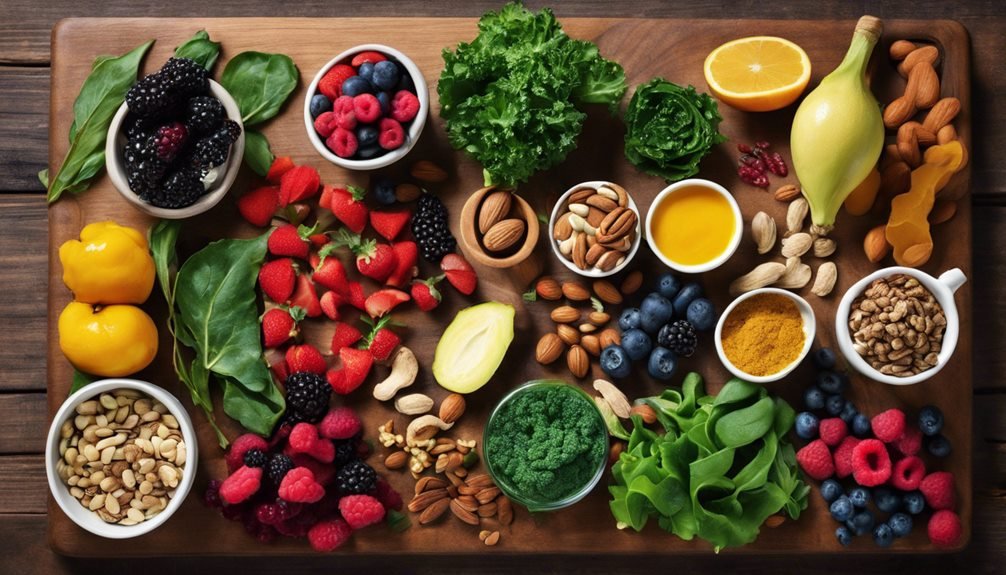
When navigating cancer treatment, incorporating anti-inflammatory recipes into your meal planning can be a supportive strategy to manage inflammation and promote overall well-being. Making healthy swaps in your dishes can elevate their nutritional value while reducing inflammatory triggers.
Opt for whole grains like quinoa instead of refined grains, use olive oil in place of saturated fats, and include plenty of colorful fruits and vegetables for added antioxidants.
To create flavorful dishes that are also anti-inflammatory, consider using herbs and spices like turmeric, ginger, garlic, and cinnamon. These ingredients not only add taste but also possess anti-inflammatory properties that can benefit your health.
Try marinating lean proteins like chicken or fish with these herbs and spices before grilling or baking for a delicious and nutritious meal.
Experiment with different recipes that incorporate these healthy swaps and flavorful additions to keep your meals exciting and supportive of your well-being during cancer treatment. Remember, nourishing your body with anti-inflammatory foods can play a significant role in managing inflammation and promoting healing.
Incorporating Herbs and Spices
Navigating cancer treatment can be a challenging journey, but incorporating herbs and spices into your diet can offer a flavorful and beneficial way to support your health. Culinary herbs and exotic spices not only enhance the taste of your meals but also provide potential health benefits that may aid in managing cancer. Here are some ways to incorporate them into your diet:
- Turmeric: Known for its anti-inflammatory properties, turmeric can be added to soups, stews, and even smoothies.
- Garlic: This culinary herb isn't only flavorful but also contains compounds that may help in reducing inflammation.
- Cinnamon: Add a dash of cinnamon to your morning oatmeal or tea for a delicious and anti-inflammatory boost.
- Ginger: Known for its soothing effects on the stomach, ginger can be used in both savory and sweet dishes.
- Basil: This herb not only adds freshness to your dishes but also contains essential oils that may have anti-inflammatory effects.
Hydration and Its Impact

Staying hydrated is crucial for your overall well-being, especially during cancer treatment. Proper hydration supports your body in various ways, including maintaining electrolyte balance and aiding in nutrient absorption. Electrolytes like sodium, potassium, and magnesium are essential for cell function and muscle contractions. When you stay hydrated, you help ensure that these electrolytes are at the right levels in your body, promoting optimal health.
Hydration also plays a key role in nutrient absorption. Water helps transport nutrients throughout your body and facilitates the absorption of vitamins and minerals from the foods you eat. Adequate hydration can enhance the effectiveness of the nutrients you consume, supporting your body's healing process during cancer treatment.
Remember to drink plenty of water throughout the day, aiming for at least 8-10 cups daily. Be mindful of your hydration levels, especially during treatments that may cause dehydration. Prioritize staying hydrated to support your body's electrolyte balance and nutrient absorption, aiding in your overall well-being as you manage cancer.
Mindful Eating Practices
To establish a deeper connection with your food and nourish your body effectively, practicing mindful eating can be a valuable tool during your cancer journey. Mindful eating involves being present and fully engaged with your meals, allowing you to make conscious choices that support your well-being. Here are some tips to help you incorporate mindful eating practices into your routine:
- Engage Your Senses: Take time to appreciate the colors, smells, textures, and flavors of your food.
- Eat Without Distractions: Turn off screens and focus on the act of eating to better listen to your body's hunger and fullness cues.
- Practice Gratitude: Cultivate a sense of appreciation for the nourishment your food provides.
- Chew Slowly: Enjoy each bite mindfully, savoring the taste and texture of your food.
- Listen to Your Body: Pay attention to how different foods make you feel emotionally and physically, allowing for intuitive eating and emotional nourishment.
Consulting With a Dietitian

When managing cancer, consulting with a dietitian can play a crucial role in optimizing your nutrition and overall well-being. Dietitians offer personalized nutritional guidance, menu customization, and practical advice to help you make the best food choices during your cancer journey. By collaborating with a dietitian, you can receive tailored meal adjustments and valuable dietitian recommendations that cater to your specific needs and treatment plan.
To give you a better idea of how consulting with a dietitian can benefit you, here is a table outlining some key aspects of their services:
| Dietitian Services | Description | Benefits |
|---|---|---|
| Dietitian Recommendations | Personalized advice on dietary choices | Optimal nutrition for treatment support |
| Meal Adjustments | Tailored meal plans to meet your needs | Improved energy levels and overall health |
| Menu Customization | Crafting menus that align with your preferences | Ensuring enjoyable and nutritious meals |
Consulting with a dietitian can empower you to make informed decisions about your diet and enhance your overall well-being while managing cancer.
Staying Consistent for Long-Term Benefits
For optimal long-term benefits in managing cancer, maintaining consistency in your dietary choices proves to be a key factor in supporting your overall health and well-being. Sticking to an anti-inflammatory diet can be challenging, but the long-term results are worth the effort.
Here are some tips to help you stay consistent:
- Plan Ahead: Prepare meals in advance to avoid last-minute unhealthy choices.
- Find Support: Surround yourself with friends and family who encourage your healthy eating habits.
- Stay Informed: Keep learning about the benefits of an anti-inflammatory diet to stay motivated.
- Indulge Occasionally: Allow yourself small treats to prevent feeling deprived and maintain consistency.
- Reflect on Progress: Celebrate small victories and remind yourself of the long-term benefits of your efforts.
Frequently Asked Questions
Can Anti-Inflammatory Diets Cure Cancer?
Anti-inflammatory diets play a role in cancer management, aiding in reducing inflammation and supporting overall health. However, it's crucial to understand that there's no definitive evidence to suggest that these diets can cure cancer. Long-term effects depend on various factors, including patient compliance with the diet and other treatment options.
It's always best to consult with healthcare professionals for personalized recommendations and to incorporate anti-inflammatory diets as part of a comprehensive cancer management plan.
How Do Anti-Inflammatory Diets Affect Chemotherapy?
When you follow an anti-inflammatory diet during chemotherapy, you can potentially enhance the effectiveness of the treatment. These diets help reduce inflammation in your body, which can support the immune system and overall health. By consuming foods rich in antioxidants, omega-3 fatty acids, and phytonutrients, you may experience better tolerance to chemotherapy and improved outcomes.
Are Supplements Necessary on an Anti-Inflammatory Diet?
When following an anti-inflammatory diet, supplements can offer additional benefits to support your overall health. However, it's important to be mindful of dietary restrictions and consult with a healthcare provider before adding any new supplements. They can help tailor a plan that meets your specific needs and ensures you're getting the right nutrients without interfering with your treatment.
Always prioritize communication with your healthcare team to make informed decisions about your diet and supplements.
Can Children With Cancer Follow Anti-Inflammatory Diets?
Yes, children with cancer can benefit from anti-inflammatory diets. These diets, rich in fruits, vegetables, and whole grains, can provide essential nutritional support during cancer treatment. By reducing inflammation in the body, these diets may help alleviate side effects and support overall health.
Consulting with a healthcare provider or a registered dietitian can help tailor the anti-inflammatory diet to meet the specific needs and preferences of children battling childhood cancer.
Is It Safe to Combine Multiple Anti-Inflammatory Diets?
Combining multiple anti-inflammatory diets may sound like a good idea, but be cautious. Each diet comes with its own set of dietary restrictions that could lead to nutrient deficiencies if not balanced properly. Long term effects of such combinations on your health aren't well understood.
It's always best to consult with a healthcare provider or a registered dietitian before embarking on a complex dietary regimen to ensure your well-being.
Conclusion
Congratulations! By following an anti-inflammatory diet, you are essentially turning your body into a superhero fortress, ready to battle cancer and inflammation with every bite. Keep up the good work by fueling your body with nutrient-packed foods, staying hydrated, and practicing mindful eating habits. Remember, consistency is key to unlocking the long-term benefits of managing cancer with your diet. You've got this!
